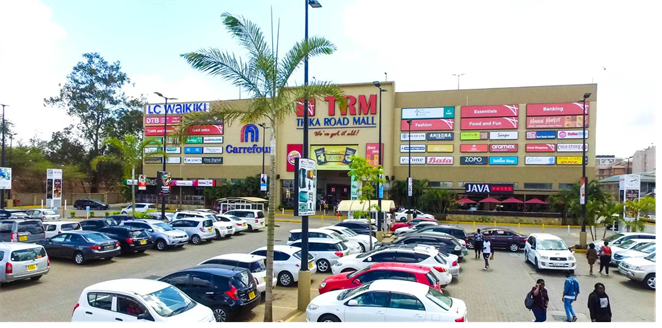Learn the art of Real estate investment and how to make money out of property development and investmemt in Nairobi, Kenya and beyond.
Real estate is one of the best ways to make money as an investor in Kenya. One has the potential to earn long term income and also enjoy tax advantages and portfolio diversification. This industry has made a lot of millionaires and you can be next.
Why Invest in Real Estate?
● It is one of the best investments as real estate appreciates with time. When you are investing in any form of real estate you're putting your money down and allowing it to grow in the future. Appreciation is not guaranteed. You will need to invest in the right form of real estate to see those big returns.
● Real estate enables an investor to enjoy a steady cash flow. Whether residential or commercial, when you rent out your space, you are guaranteed to receive monthly or annual income.
● Holding real estate in the long term gives an investor security as one can wait for it to appreciate to sell. As you hold, you can still rent it out thus earning a monthly income while you wait for your property to rise in value.
● Real estate investing comes with tax benefits. There are several expenses associated with owning real estate. They include, property taxes, marketing expenses, mortgage interest, maintenance and repair costs and property management fees. If one sells their property for more than they invested, the gain is taxed as capital gains tax which has lower rates than your income.
● Real estate is considered to be a hedge against inflation. When prices of other goods and services increase, property values increase too. Investing in real estate can thus provide you with rising monthly income protecting you when the cost of everything is rising too. Here are ways to put money to work in real estate, as well as some information about each method.
1. Residential Real Estate
This is one of the most common ways to make money in real estate. People will always need a place to live thus investing in residentials is a good way to go. Before investing in residential property you must keep in mind the mantra ‘Location, location, location’. This means that residential properties vary widely in value due to their location. Location is everything when it comes to real estate. If you are considering putting up a long term rental, location should be forefront.
2. Leasing options.
If one can't afford to buy a property, you can as well lease it for a specified period of time. All one needs is a lease agreement. The contract gives you the right to use and enjoy another person's property for a specific period of time. You can lease the property for residential, commercial or agricultural purposes. Leasing also comes with the option to purchase the property. This is advantageous as one can use the income generated from the property to buy it.
Lease Example:
Business people lease buildings. They use these buildings to run hotels, hospitals, colleges etc. In the end, they make so much money from their operations and they end up buying the buildings.
3. Renovation flips
This strategy involves purchasing houses at a lower price, and then fixing them and selling them at a profit. It is basically giving an old house a makeover for it to look modern.
This strategy should be done by someone who is experienced in real estate as it can be risky. Every property requires its own renovation budget. Your purchasing decisions will be made based on your ability to evaluate and estimate the various renovation costs associated with a given property to ensure it is within your allocated budget. That said, many times unexpected costs arise during the renovation process. For example, you could tear down the walls and discover there’s mold, a load-bearing beam that needs to be replaced or old wiring that needs to be redone. These types of unforeseen costs can cause you to go over your budget and eat into your return.
4. Real Estate Investment Trusts (REITS)
What is a REIT?
A REIT is a company that finances income producing real estate. In Kenya, REITS are traded on the Nairobi Stock Exchange (NSE), like other companies offering investors a share in real estate.
How REITs Work?
REITS operate just as normal companies do. They allow investors to acquire a stake in real estate portfolios. These portfolios generate income from owning real estate properties such as apartments, hotels, office buildings, shopping malls and many more. REITS manage leased properties on behalf of investors and afterwards they pass on the rent collected to them. They also invest in mortgage debt. As an example, let’s assume that a developer is building a new apartment building. They would take out a loan to pay for the project and then a REIT might purchase the debt on the building from the original lender. The building owner would still own the building, but the REIT would own the debt.
REITs Structure.
REITs are structured as open-ended or close-ended. A close-ended fund can be converted to an open-ended fund and vice-versa depending on the circumstances.
Open-Ended REITs.
In this type of REIT, shares can be redeemed or issued to investors anytime. The value of an investment or redemption is determined by the net value of the assets. The net value of the asset is then determined by the total value of the assets held by the REIT. That minus the liabilities involved divided by the outstanding shares. Thus, the size of the fund may increase or decrease as investors acquire or dispose of securities.
Closed-Ended REITs.
In this type of REIT, the number of outstanding shares is fixed. They raise money through selling shares to the public. Price is determined by what investors are willing to pay for them at any given point in time. Thus, price fluctuates as it is influenced by forces of demand and supply.
How to Invest in REITs in Kenya.
One can purchase REITs through a broker from the Nairobi Stock Exchange (NSE). Secondly, you can also buy them on any other major international exchange platform. They can also be bought through a mutual or exchange-traded fund. Purchasing REITs directly from NSE can be done easily, the same way as you buy shares. For example, one can visit a local broker and request to purchase shares of Stanlib Fahari I-REIT. If one wants to purchase through a mutual fund, he or she can invest in a fund that specializes in real estate.
Taxation of REITs in Kenya.
If REITs comply with regulations, they are income tax-exempt. REITs must be registered under the Commissioner of Taxes and the Capital Markets Authority (CMA).
The following are the instances that REIT holders must account for tax:
-
REIT holders must account for withholding tax on interest income and dividends. Thus upon distribution of profits, investors are subject to tax at the rate of 5% (10% non-resident) of dividends and 15% (15% non-resident) for interest.
-
Capital gains tax must be accounted for in the event of gains from transfers or redemption of units from a REIT
5. Vacation rentals
This is a very profitable area in real estate. Though short term, it gives good returns. These rentals are like hide out spaces for anyone who can afford them. The best places to invest when it comes to vacation rentals are areas with tourist attractions such as Nairobi, Mombasa, Nakuru and Nanyuki. Buying an apartment in the lavish Kilimani, Kileleshwa and Westlands areas could be a viable tool for the lucrative Airbnb business. It is reported that Airbnb hosts in Nairobi, Kenya are netting about USD 40m annually.
Commercial Real estate

This is a good strategy especially for people looking to invest in large projects such as shopping malls, office buildings, hotels, villas etc.With this type of real estate investment, one earns through leasing the spaces to tenants. The rent is agreed upon beforehand and all terms pertaining to the rental too.
One of the pros of commercial real estate is that it can lead to huge progress. Developing a commercial property in a specific area increases the value of the entire area. A good example of this is the Thika Road Mall and Garden City Mall. Owning a commercial property also has some downsides to it. It is capital intensive, it requires professional management, and has many tedious steps such as securing paperwork and zoning documents.
7. Buying and Selling of Land
This is a common way through which people make money in Kenya. One can buy a piece of land, subdivide it into smaller plots and sell it to willing buyers at a profit. Some buyers can purchase it to build their own homes, for agricultural purposes or they too can hold it to sell at a profit in the future.
Example.
If one acre of land costs 2 million, you can end up making 6 million from selling the land. All you need is to subdivide the land into one eight pieces and sell each at 750000 kshs. After deducting the expenses, you still have a good amount as profit. Most Real Estate companies and agencies in Kenya have made cash through buying cheap plots in Nairobi, Subdividing and selling them to property buyers in nairobi-Kenya. Land investments in kamulu, Joska and affordable plots for sale in Kitengela town and Kitengela Acacia have made a fortune for Property company and affordable housing developers.
Bottom Line
There is definitely money to be made through real estate investing. There are also different ways to make money in real estate. The key is to start small and work your way up Are you interested in investing in real estate today and don't know where to start? Get in touch with us and we will lead you through every step of the way.
TAKE AWAY
- Identify the property classes you want to invest in (residential buildings for rent, commercial property ( office, retail), Trusts, Land (industrial, agricultural, recreational), leaseholds, leases).
- Conduct comprehensive market survey.
- Set out your investment goals.
- Get to understand local and national legal requirements.
- Plan your project financing.
- Set out your property investment team / schedule / framework.
- Kick off your investment plan.
- Manage your investment.

Unlike other classes of asset investments such as public bonds, securities, and fixed interest accounts; property (real estate) investment is a game of patience. Starting by investing in residential property for rent which has an average annual return on investment (ROI) of 10% would sound a risky affair for an investor who needs their money back within a year: to a wise and patient investor, the same rental block would serve as a tool for project refinancing from banks and other financiers, store of wealth and a subject of tax compensation.

Img-src: Property Development and Investments Forum (Invest with Nakibolis)


